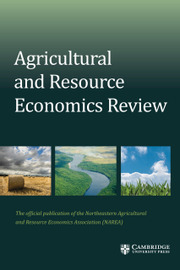Article contents
Search Theory Risk Preference and Farmland Preservation
Published online by Cambridge University Press: 15 September 2016
Abstract
This paper uses search theory to examine the role that risk preference (RP) plays in farmland preservation. Assuming that the distribution of the offer price is fixed, the analysis indicates that risk-averse agents have lower reservation prices than risk-neutral agents, and that agricultural land held by the former exits farming at a faster rate. The results also show that farmland preservation policies which increase reservation prices have a greater capitalization effect if agents are risk-loving, and that such policies, while effectively protecting the interest of land speculators, may be less effective in serving the needs of farming and farm-held open space.
- Type
- Articles
- Information
- Copyright
- Copyright © 1996 Northeastern Agricultural and Resource Economics Association
References
- 7
- Cited by


